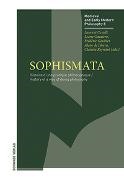En savoir plus
The manner in which philosophy was practised in the Middle Ages was highly variagated. Until now, historiography has largely focused on the canonical genres of commentaries and treatises. This volume is devoted to another and fundamental type of medieval philosophical practice and demonstrates that the so-called sophismatic practice and literature, largely neglected to this day, had a significant influence on scholastic philosophical thought.
A propos de l'auteur
Laurent Cesalli is Professor for Medieval Philosophy at the University of Geneva and, together with Gerald Hartung (Wuppertal), co-editor of Grundriss der Geschichte der Philosophie (Ueberweg).
Leone Gazziero is a research fellow at the CNRS at the STL (Savoirs, Textes, Langage) laboratory at the University of Lille. He is the director of the ERC Synergia large-scale project “Logic in Reverse” which investigates medieval theories of bad arguments in Greek, Hebrew, Arabic and Latin cultures.
Frédéric Goubier is a medievalist, researcher in philosophy at the University of Geneva and author, together with Sten Ebbesen, of the catalogue of sophismatic literature (2010).
Alain de Libera is Professor emeritus for Medieval Philosophy at the University of Geneva, Directeur de Recherche at the EPHE (École Pratique des Hautes Études, Paris), and Professor emeritus at the Collège de France (Paris).
Clarisse Reynard is a doctoral student at the University of Geneva, where she is preparing a PhD on late medieval theories of memory, a work that will include the first critical edition of Johannes Versoris’ commentary on Aristotle’s De memoria et reminiscentia.
Résumé
The manner in which philosophy was practised in the Middle Ages was highly variagated. Until now, historiography has largely focused on the canonical genres of commentaries and treatises. This volume is devoted to another and fundamental type of medieval philosophical practice and demonstrates that the so-called sophismatic practice and literature, largely neglected to this day, had a significant influence on scholastic philosophical thought.
Préface
A hidden side of medieval philosophizing

